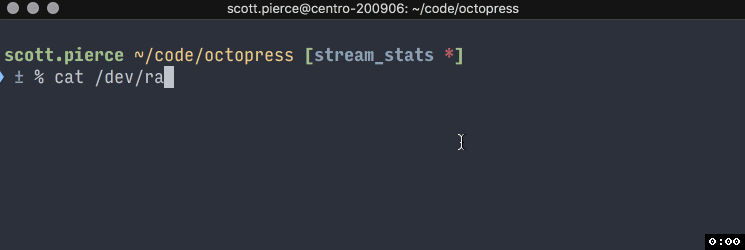A Rustic Journey Through Stream Stats¶

After playing Guessing Game from the Rust Book a few times, it was time to make something a little more substantial. We're going to create stream_stats, a CLI program which prints throughput statistics from stdin while redirecting through stdout. Think tee + wc -l + watch all at the same time.
TL;DR - cargo install stream_stats
Here is a quick demo of the program:

Today, I we'll build this program up in 6 steps smallish steps. The minimum requirement of this program was the live feedback as seen in the demo and minimal impact on the overall performance.
Step 1 - Reproducing cat Inefficiently¶
First step is to replicate cat. We'll do it as demonstrated by Rust's own documentation.
use std::io;
fn main() {
let mut buffer = String::new();
while io::stdin().read_line(&mut buffer).unwrap() > 0 {
print!("{}", buffer);
buffer.clear();
}
}
I'm using
unwrapto keep our program short and sweet.
Save the code as stream_stats.rs and build it using rustc -O stream_stats.rs. This will
compile the program into stream_stats. We can now run the program with
./stream_stats < stream_stats.rs or cat stream_stats.rs | stream_stats. This should output the source code we just wrote.
The program is sufficient for small streams, but will perform horribly on large files.
Step 2 - Reproducing cat Efficiently with Buffering¶
It can be excessively inefficient to work directly with a Read instance. For example, every call to read on TcpStream results in a system call. A BufReader performs large, infrequent reads on the underlying Read and maintains an in-memory buffer of the results.
Lets add some buffer use to increase performance and get it near the speed of cat. Replace the contents of stream_stats.rs with the following, recompile, and run the program.
use std::io::{self, BufRead, BufReader, BufWriter, Write};
static READ_BUF_SIZE: usize = 1024 * 1024;
fn main() {
let mut reader = BufReader::with_capacity(READ_BUF_SIZE, io::stdin());
let mut writer = BufWriter::new(io::stdout());
let mut buffer = vec![];
while reader.read_until(b'\n', &mut buffer).unwrap() > 0 {
writer.write(&buffer).unwrap();
buffer.clear();
}
writer.flush().unwrap();
}
The exact difference is viewable on Github. Here's a one-liner which to help with the build/run cycle:
rustc -O ./stream_stats.rs && ./stream_stats < stream_stats.rs
For a few extra lines, we get a lot of performance. There are ways to get even more performance, but it won't be worth the code complexity at this time.
Step 3 - Count the Lines¶
We're ready to start counting lines. We'll introduce a struct to hold a start
time and line count.
use std::io::{self, BufRead, BufReader, BufWriter, Write};
use std::time::Instant;
static READ_BUF_SIZE: usize = 1024 * 1024;
struct Stats {
started: Instant,
lines: usize,
}
fn main() {
let mut reader = BufReader::with_capacity(READ_BUF_SIZE, io::stdin());
let mut writer = BufWriter::new(io::stdout());
let mut buffer = vec![];
let mut stats = Stats {
started: Instant::now(),
lines: 0,
};
while reader.read_until(b'\n', &mut buffer).unwrap() > 0 {
writer.write(&buffer).unwrap();
stats.lines += 1;
buffer.clear();
}
writer.flush().unwrap();
eprintln!("lines: {}, {:?}", stats.lines, stats.started.elapsed());
}
Again the exact difference is viewable on Github.
Step 4 - Write to /dev/tty¶
Using eprintln! is easy, but bad practice for non-error output. The next step is moving the output to /dev/tty. As a reminder, we're also not using println! because we're reserving it for the original content piped from stdin.
use std::fs::{File, OpenOptions};
use std::io::{self, BufRead, BufReader, BufWriter, Write};
use std::time::Instant;
static READ_BUF_SIZE: usize = 1024 * 1024;
struct Stats {
started: Instant,
lines: usize,
tty: File,
}
impl Stats {
fn new(tty: &str) -> Stats {
Stats {
started: Instant::now(),
lines: 0,
tty: OpenOptions::new()
.write(true)
.append(true)
.open(tty)
.expect("Cannot open tty for writing!"),
}
}
}
fn main() {
let mut reader = BufReader::with_capacity(READ_BUF_SIZE, io::stdin());
let mut writer = BufWriter::new(io::stdout());
let mut buffer = vec![];
let mut stats = Stats::new("/dev/tty");
while reader.read_until(b'\n', &mut buffer).unwrap() > 0 {
writer.write(&buffer).unwrap();
stats.lines += 1;
buffer.clear();
}
writer.flush().unwrap();
writeln!(
stats.tty,
"lines: {}, {:?}",
stats.lines,
stats.started.elapsed()
).expect("Could not write to tty!");
}
Exact difference is viewable on Github.
Step 5 - Beautify Stats Output¶
The display logic is going to get a little more complex. We want to move the string formatting code to a fmt::Display trait. We'll also add the kilobytes to the displayed stats.
use std::fmt;
use std::fs::{File, OpenOptions};
use std::io::{self, BufRead, BufReader, BufWriter, Write};
use std::time::Instant;
static READ_BUF_SIZE: usize = 1024 * 1024;
static CLEAR_LINE: &str = "\x1B[1G\x1B[2K";
struct Stats {
started: Instant,
lines: usize,
bytes: usize,
tty: File,
}
impl Stats {
fn new(tty: &str) -> Stats {
Stats {
started: Instant::now(),
lines: 0,
bytes: 0,
tty: OpenOptions::new()
.write(true)
.append(true)
.open(tty)
.expect("Cannot open tty for writing!"),
}
}
}
impl fmt::Display for Stats {
fn fmt(&self, f: &mut fmt::Formatter) -> fmt::Result {
let elapsed = self.started.elapsed();
let seconds: f64 = elapsed.as_secs() as f64 + elapsed.subsec_nanos() as f64 * 1e-9;
if seconds == 0.0 {
return write!(f, "");
}
let kb = self.bytes as f64 / 1024 as f64;
let kb_per_sec = kb / seconds;
let lines_per_sec = self.lines as f64 / seconds;
write!(
f,
"{}{:.1} sec | {:.0} kb [ {:.1}/s ] | {} lines [ {:.0}/s ]",
CLEAR_LINE,
seconds,
kb,
kb_per_sec,
self.lines,
lines_per_sec
)
}
}
fn main() {
let mut reader = BufReader::with_capacity(READ_BUF_SIZE, io::stdin());
let mut writer = BufWriter::new(io::stdout());
let mut buffer = vec![];
let mut stats = Stats::new("/dev/tty");
while reader.read_until(b'\n', &mut buffer).unwrap() > 0 {
writer.write(&buffer).unwrap();
stats.lines += 1;
stats.bytes += &buffer.len();
buffer.clear();
}
writer.flush().unwrap();
writeln!(&stats.tty, "{}", &stats).expect("Could not write to tty!");
}
Exact difference is viewable on Github.
Step 6 - Display the stats 10 times per second¶
We're finally at the most useful part of the program. Viewing the stats while the stream is still going.
For this task, we introduce a thread which loops forever sleeping a little and
waking to output the stats. Because of the thread, we need to use Arc to
safely tell Rust another thread is going to have a pointer to the stats object.
To be honest, I don't fully understand why I need to use AtomicUsize. I tried
to keep the usize variables would get errors regarding mutability. If someone
out there can remove the AtomicUsize without introducing unsafe please let
me know!
Here's the final code listing:
use std::fmt;
use std::fs::{File, OpenOptions};
use std::io::{self, BufRead, BufReader, BufWriter, Write};
use std::sync::Arc;
use std::sync::atomic::{AtomicUsize, Ordering};
use std::thread::{self, sleep};
use std::time::{Duration, Instant};
static READ_BUF_SIZE: usize = 1024 * 1024;
static CLEAR_LINE: &str = "\x1B[1G\x1B[2K";
static UPDATE_INTERVAL_MS: u64 = 100;
struct Stats {
started: Instant,
lines: AtomicUsize,
bytes: AtomicUsize,
tty: File,
}
impl Stats {
fn new(tty: &str) -> Stats {
Stats {
started: Instant::now(),
lines: AtomicUsize::new(0),
bytes: AtomicUsize::new(0),
tty: OpenOptions::new()
.write(true)
.append(true)
.open(tty)
.expect("Cannot open tty for writing!"),
}
}
fn add(&self, buffer: &Vec<u8>) {
self.lines.fetch_add(1, Ordering::Relaxed);
self.bytes.fetch_add(buffer.len(), Ordering::Relaxed);
}
}
impl fmt::Display for Stats {
fn fmt(&self, f: &mut fmt::Formatter) -> fmt::Result {
let elapsed = self.started.elapsed();
let seconds: f64 = elapsed.as_secs() as f64 + elapsed.subsec_nanos() as f64 * 1e-9;
if seconds == 0.0 {
return write!(f, "");
}
let bytes = self.bytes.load(Ordering::Relaxed) as f64;
let lines = self.lines.load(Ordering::Relaxed) as f64;
let kb = bytes / 1024 as f64;
let kb_per_sec = kb / seconds;
let lines_per_sec = lines / seconds;
write!(
f,
"{}{:.1} sec | {:.0} kb [ {:.1}/s ] | {:.0} lines [ {:.0}/s ]",
CLEAR_LINE,
seconds,
kb,
kb_per_sec,
lines,
lines_per_sec
)
}
}
fn main() {
let mut reader = BufReader::with_capacity(READ_BUF_SIZE, io::stdin());
let mut writer = BufWriter::new(io::stdout());
let mut buffer = vec![];
let stats = Arc::new(Stats::new("/dev/tty"));
let stats_clone = stats.clone();
thread::spawn(move || loop {
sleep(Duration::from_millis(UPDATE_INTERVAL_MS));
write!(&stats_clone.tty, "{}", &stats_clone).expect("Could not write to tty!");
});
while reader.read_until(b'\n', &mut buffer).unwrap() > 0 {
writer.write(&buffer).unwrap();
stats.add(&buffer);
buffer.clear();
}
writer.flush().unwrap();
writeln!(&stats.tty, "{}", &stats).expect("Could not write to tty!");
}
Exact difference is viewable on Github.
Closing Thoughts¶
I personally learned a lot assembling these steps and wish I did this before
publishing the cargo crate of the same name.
Any suggestions, comments, and corrections welcome on this post or the final crate are welcome. https://github.com/ddrscott/stream_stats
Thanks for learning with me!